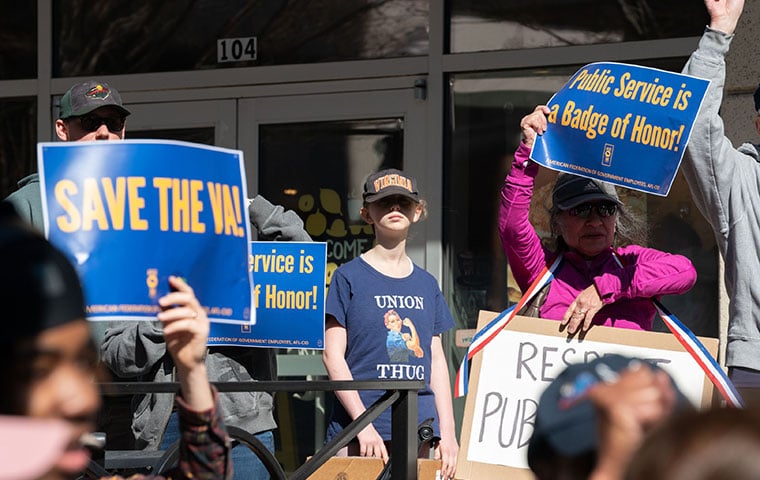 Union Members, Government Employees, Organized By American Federation Of Government Employees (AFGE) Protest At Rep. Kiggans (R-VA) Office In Virginia Beach, VA On March 22, 2025. Image: Zach D Roberts/NurPhoto/Shutterstock
By: FEDweek Staff
Union Members, Government Employees, Organized By American Federation Of Government Employees (AFGE) Protest At Rep. Kiggans (R-VA) Office In Virginia Beach, VA On March 22, 2025. Image: Zach D Roberts/NurPhoto/Shutterstock
By: FEDweek StaffFederal unions representing employees affected by the cancellation of negotiated contracts by some agencies under a Trump administration order—with more likely soon to come (see related story)—have denounced the agency actions as retaliatory, and meanwhile are facing a potentially significant financial impact on themselves.
The AFGE union for example called the VA’s action to cancel contracts representing the majority of its employees “another clear example of retaliation against AFGE members for speaking out against the illegal, anti-worker, and anti-veteran policies of this administration.”
Said the NFFE union, “VA healthcare professionals rely on their union membership to safely report mismanagement, expose cover-ups, and push back against political interference and corrupt private contracting. Eliminating unions eliminates those safeguards, which is exactly why they’re doing it.”
The unions also termed the cancellations as against OPM guidance that agencies should not terminate any contracts until the conclusion of litigation. Even though two injunctions that had temporarily blocked the order have been lifted, union-sponsored cases are still pending in the trial courts and in those suits, the Justice Department has argued that agencies are complying with that instruction, the unions say.
Unions said they will continue to pursue the court cases, and legislation is pending in Congress to block the order.
However, in the meantime revoking of contracts could have significant financial impacts on unions. Initial OPM guidance on the order specifically told agencies to disavow commitments including those: entitling employees to official time to perform certain union-related purposes during working hours; giving unions free use of agency office space or other resources such as computer systems; and allowing union dues to be deducted from employees’ pay.
While terms of contracts vary, the VA for example said that “in 2024 alone, over 1,900 VA bargaining-unit employees spent more than 750,000 hours of work on taxpayer funded union time – including some who are paid more than $200,000 a year.” It further said that it has been providing nearly 190,000 square feet of office space to unions rent free, at a cost in the millions.
Unions in contrast view official time—allowed under law for decades—as a tradeoff for the obligation that they represent all employees in a bargaining unit, in grievances and in other ways, regardless of whether they pay dues. They also challenge agency estimates of the cost of their office space usage, since in many cases the space could not be rented out.
In anticipation of agencies potentially cancelling automated dues withholding from pay—the VA, for one, already has done so—unions have been urging employees to switch to direct deductions from banking accounts.
Repudiating contracts also means that agencies will not have to abide by other commitments they have made in them to employees. Those include in some cases steps to soften the impact on employees of RIFs and reorganizations.
Longer-term, agencies could ask the FLRA to decertify the affected unions. That’s a rare step that most notably occurred in the 1980s to the union that then represented air traffic controllers and that led them into an illegal strike.
Deferred Resignation Periods about to End for Many; Overall 12% Drop
Retirement Surge Likely as Deferred Resignation Periods End
Senate Rejects Bills to Defer Shutdown; Familiar Process Lies Just Ahead
Senate Bill Would Override Trump Orders against Unions
Report Describes Impact of Shutdown on Employees, Agencies
TSP Adds Detail to Upcoming Roth Conversion Feature
See also,
How to Handle Taxes Owed on TSP Roth Conversions? Use a Ladder
The Best Ages for Federal Employees to Retire
Best States to Retire for Federal Retirees: 2025

